
|
Astronomy Picture Of the Day (APOD)
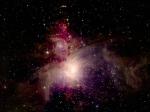 Orion Nebula: The 2MASS View
Orion Nebula: The 2MASS View
12.06.1998
Few astronomical sights excite the imagination like the nearby stellar nursery known as the Orion Nebula. The Nebula's glowing gas surrounds hot young stars at the edge of an immense interstellar molecular cloud only 1,500 light-years away.
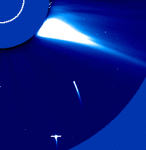 SOHOs Twin Sungrazers
SOHOs Twin Sungrazers
11.06.1998
This four frame animation (courtesy D. Biesecker) shows two comets arcing toward a fatal fiery encounter with the Sun. These discovery images were recorded by the LASCO instrument on board the space-based SOHO solar observatory on June 1-2.
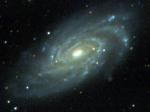 NGC 6070: First Light for Sloan
NGC 6070: First Light for Sloan
10.06.1998
The graceful spiral galaxy NGC 6070, 100 million light-years distant in the constellation Serpens, is helping astronomers celebrate "First Light" (the first test sky images) for an exciting new telescope built to perform the ambitious Sloan Digital Sky Survey.
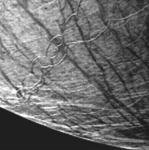 Ice Cusps on Europa
Ice Cusps on Europa
9.06.1998
Europa's icy crust has many unusual features. Pictured above is part of Europa's southern hemisphere photographed by the Galileo spacecraft currently orbiting Jupiter. Europa is one of the largest moons of Jupiter, and is thought to have oceans of water underneath its ice-covered surface.
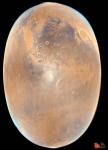 A Mars Glint
A Mars Glint
8.06.1998
If aligned just right, even a planet can produce a glint. The above combined pictures of Mars make the red planet appear unusually elongated - Mars is really almost spherical. However, these pictures were taken when the Sun was nearly directly behind the Mars Global Surveyor (MGS) spacecraft.
 The Hubble Deep Field
The Hubble Deep Field
7.06.1998
Galaxies like colorful pieces of candy fill the Hubble Deep Field - humanity's most distant yet optical view of the Universe. The dimmest, some as faint as 30th magnitude (about four billion times fainter...
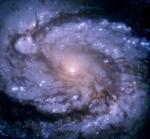 M100: A Grand Design
M100: A Grand Design
6.06.1998
Majestic on a truly cosmic scale, M100 is appropriately known as a Grand Design spiral galaxy. A large galaxy of over 100 billion or so stars with well defined spiral arms, it is similar to our own Milky Way.
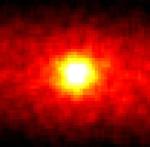 Neutrinos in the Sun
Neutrinos in the Sun
5.06.1998
Neutrinos, along with things like electrons and quarks, are fundamental pieces of matter according to physicists' Standard Model. But neutrinos are hard to detect. Readily produced in nuclear reactions and particle collisions, they can easily pass completely through planet Earth without once interacting with any other particle.
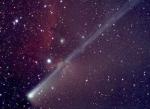 Comet SOHO and Nebulae in Orion
Comet SOHO and Nebulae in Orion
4.06.1998
Astrophotographer Michael Horn captured this gorgeous view of comet SOHO in the dark night sky above Wandibindle, Queensland, Australia on May 23rd. On this date, comet SOHO was moving against the background of the nebula-rich constellation of Orion.
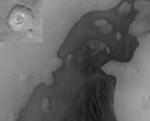 Martian Crater Shows Evidence of Dried Pond
Martian Crater Shows Evidence of Dried Pond
3.06.1998
Did a pond once exist in this Martian crater? Recent photographs by the spacecraft Mars Global Surveyor, currently in orbit around Mars, show features unusual for Mars yet similar to a dried pond on Earth.
|
January February March April May June July August September October November December |
||||||||||||||||||||||||||||||||||||||||||||||||||||||||